Text
Granblue Fantasy Side Story: Memories of Arshivelle (Chapter 8)
Hey, everyone! I’m back, getting started now with translating the second book of the Young Pommern side story manga. Enjoy!
Previous chapter
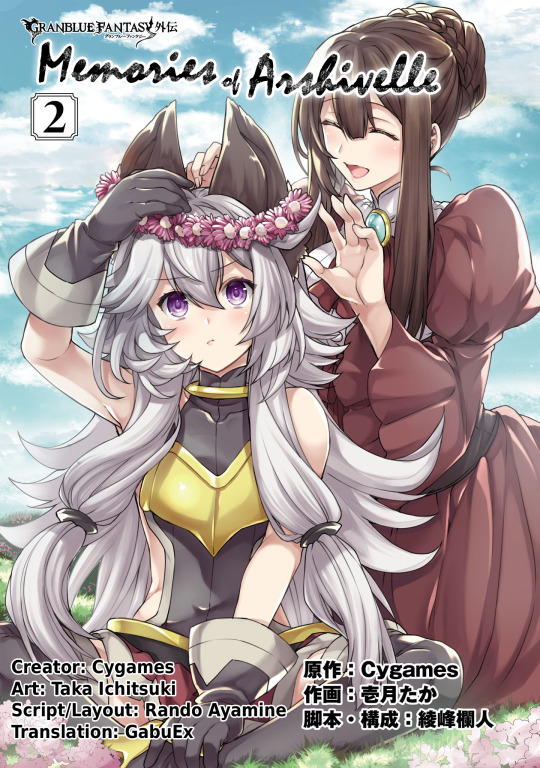

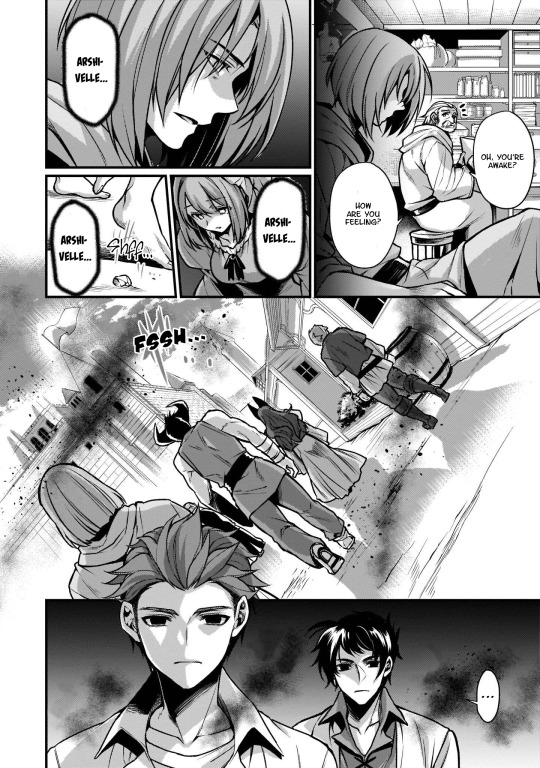
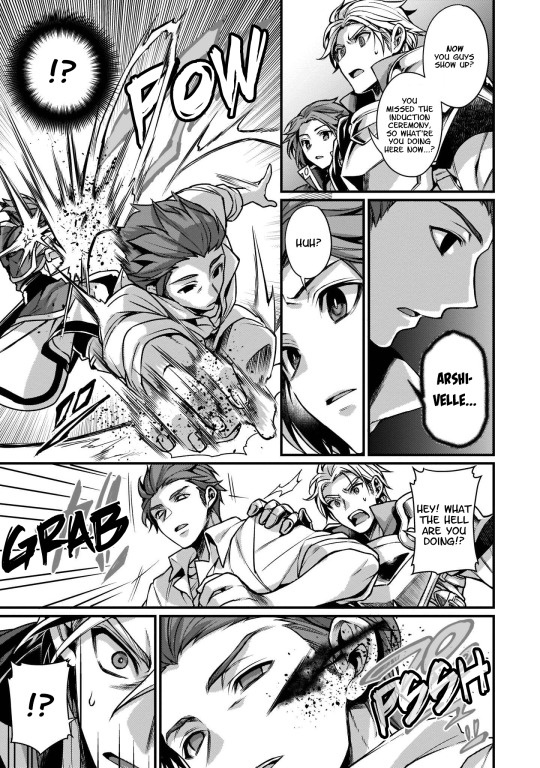


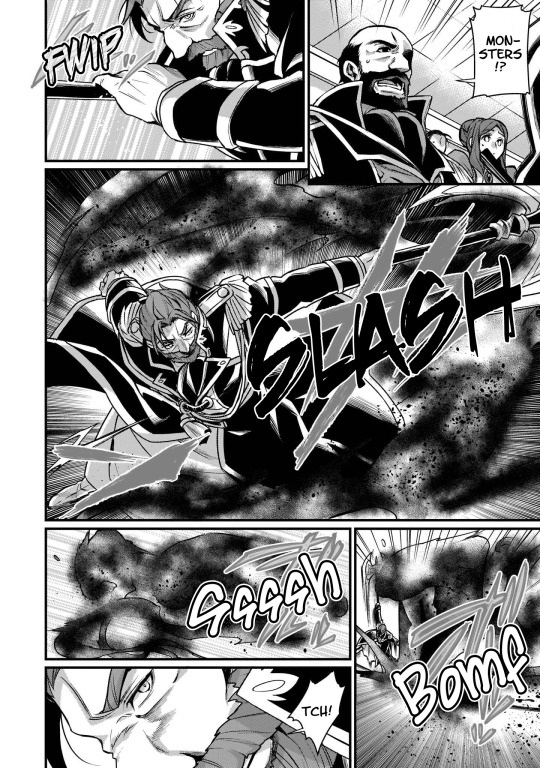

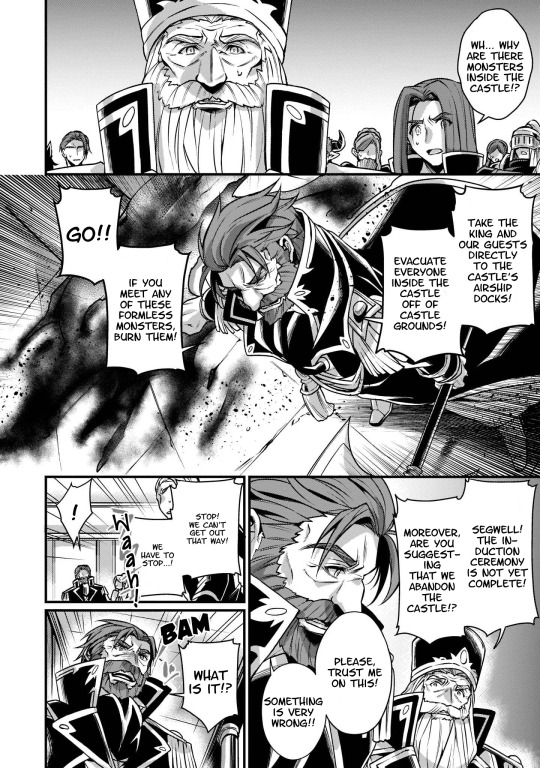




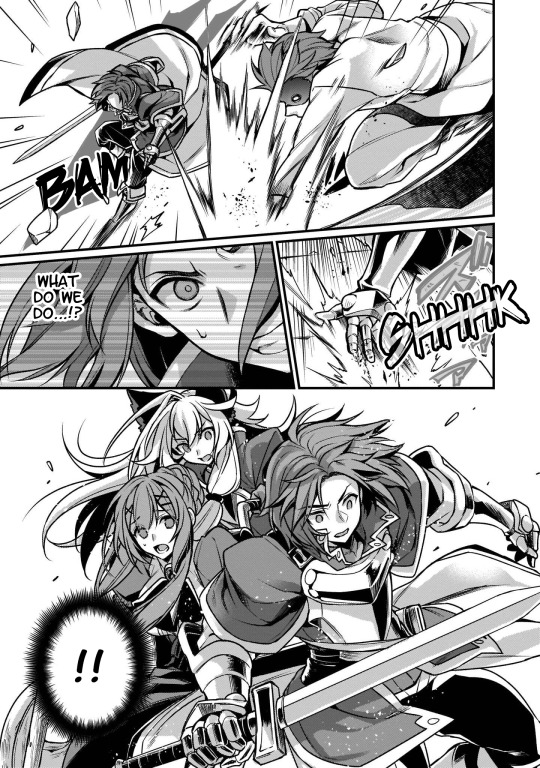

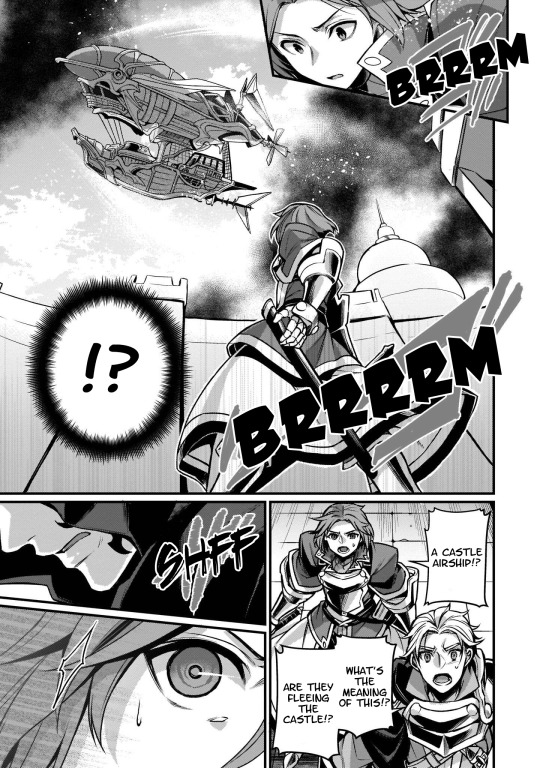


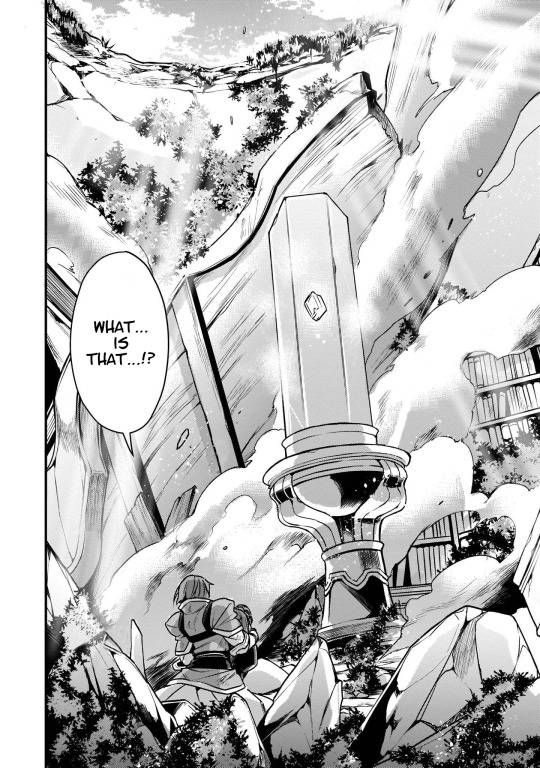


Previous chapter
Translator Notes:
I do my best to hew as close as possible to the original Japanese when translating, but every now and then you run into something that I assume worked in Japanese but just doesn't work in English... like, at all. Sometimes that's due to grammatical differences between languages, and sometimes that's due to difference in how word choice comes across in one language versus the other, but either way, in those cases, I tend to just throw out the Japanese lines that don't work and come up with brand new lines that in my view still get across the spirit of the original Japanese lines while sounding like much more natural English that fits the characters in question.
In this chapter, there were two cases where I had to do that, which cover both of those circumstances. The first was Segwell's line, "What devilry is this!?" The original Japanese was konna koto ga--!!, which literally translates as, "This sort of thing...!!" Obviously, that would be absurd to include as-is, so I instead substituted a completely invented alternate line that was intended to convey his shock and horror at the scene before him while still sounding like a thing he might say.
Japanese has a grammatical feature where you can often just completely leave off an entire part of a sentence if the emotional expression is conveyed adequately without it, and it always is a bit tricky to know what to do with those lines when translating to English. The most extreme example of this is the word chotto, which literally means "a little bit", but can be used as a way to politely decline something. For example, if you asked a polite Japanese woman whether she wanted to do something tomorrow and she did not, she might simply reply, Ashita wa chotto... ("Tomorrow's a little...") and it's up to you to fill in the blanks that she's trying to let you down easy.
The second case was this exchange:
Zanzekuel: "The hell!? I thought you took care of that one!"
Annette: "Yeah, you an' me both, idiot!"
The exact Japanese was this:
Zanzekuel: Nanda arya!? Omae chanto taoshite oke yo!! ("What!? Damn!! Defeat them properly before moving on!!")
Annette: Dekiru nara yatteru wa yo!! ("If I were able to, I would be doing so!!")
In this case, the direct translation isn't missing any part of speech like it was in the case with Segwell's line, but the direct translation in English just sounds super stilted and out of character for those two. Since the main idea is to convey Zanzekuel's annoyance that Annette hadn't fully defeated a monster and Annette's annoyance that he thinks that's her fault, I figured I'd just replace these two lines with lines of my own creation that sounded in my view much better in English while still conveying the general idea underpinning the Japanese lines.
Hopefully those lines turned out okay!
#granblue fantasy#granblue fantasy side story#side story#manga#memories of arshivelle#pommern#young pommern#pommern's mom#pommern's dad#annette#hulk#shinza#npcs#king of zeilsten#lord segwell#translator notes
28 notes
·
View notes
Text
Granblue Fantasy Side Story: Memories of Arshivelle (Chapter 7)
Hey everyone! This here’s the last chapter of book 1 - but there are still two books at the moment to translate, so we’re far from done overall. :) Enjoy!
Previous chapter
Next chapter



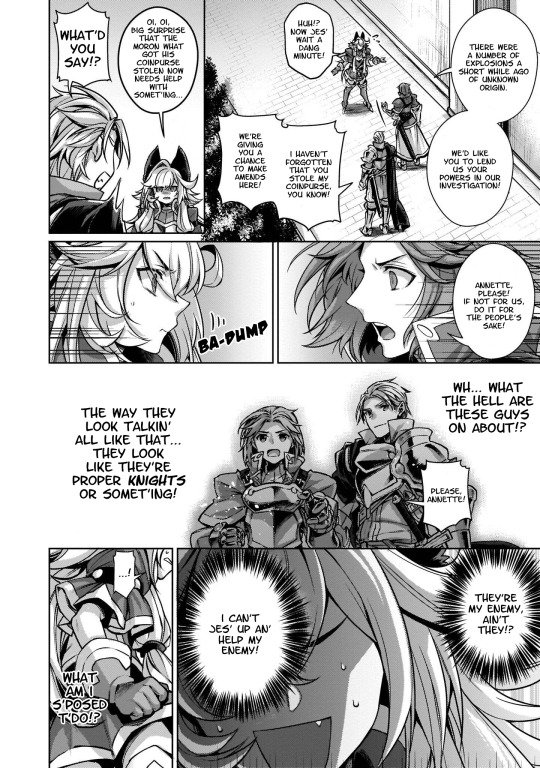

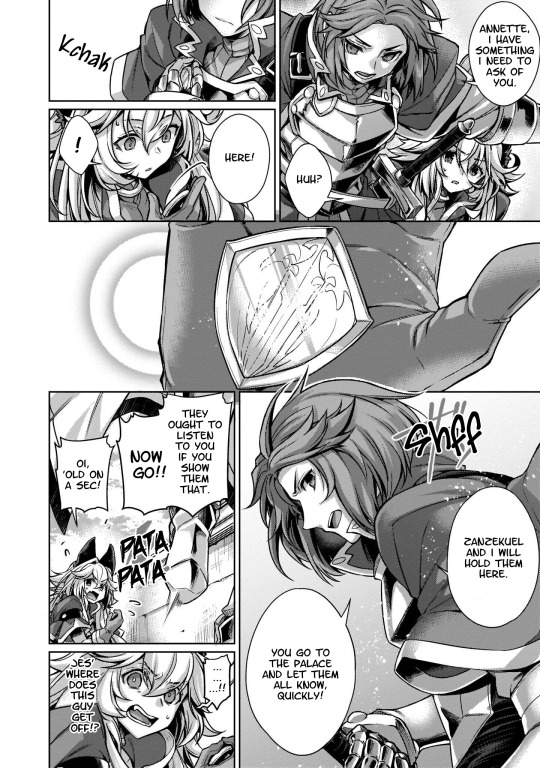

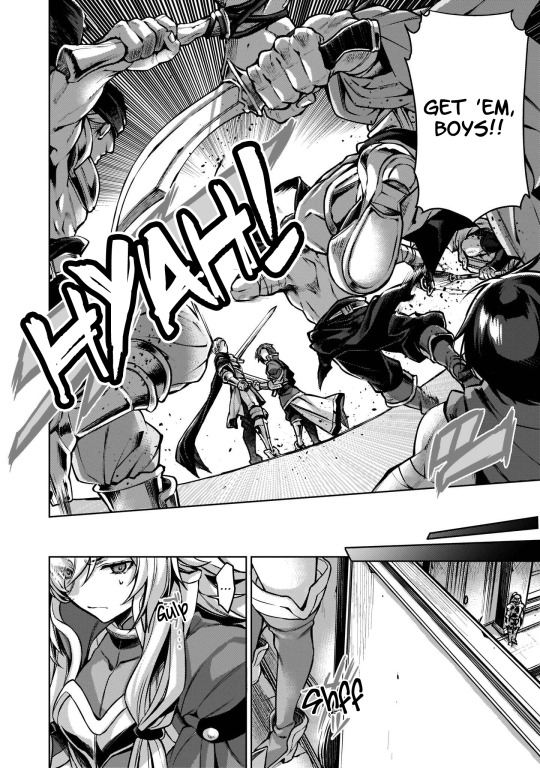
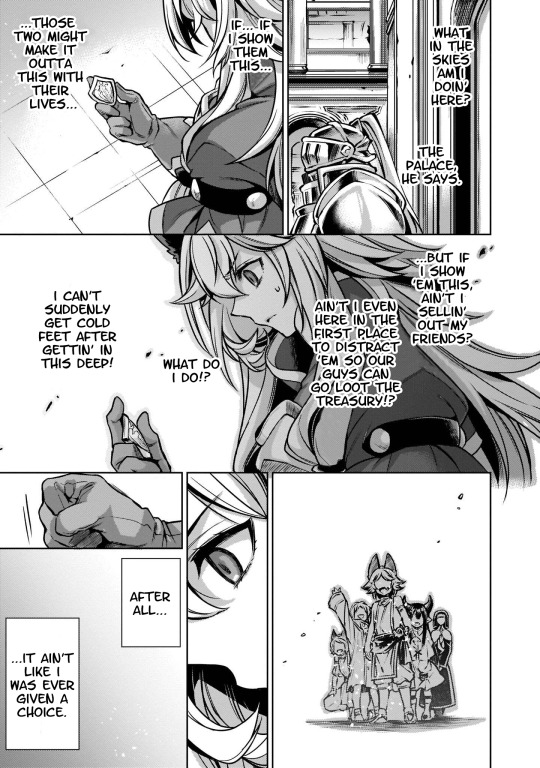






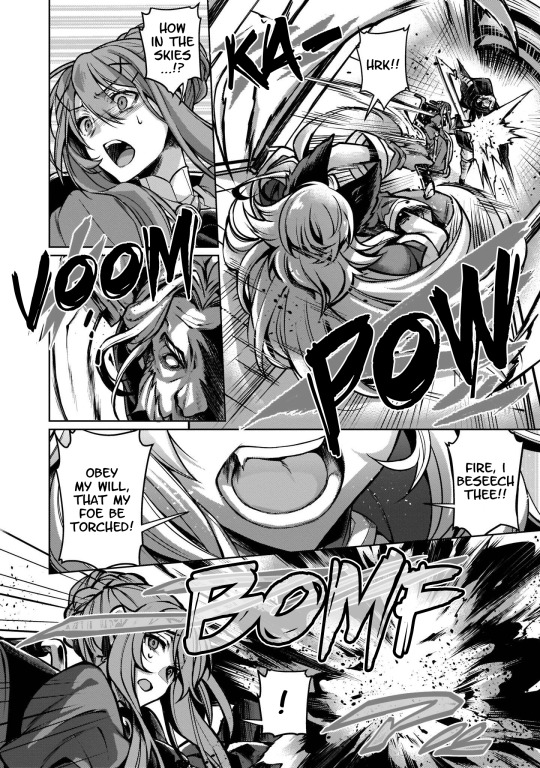


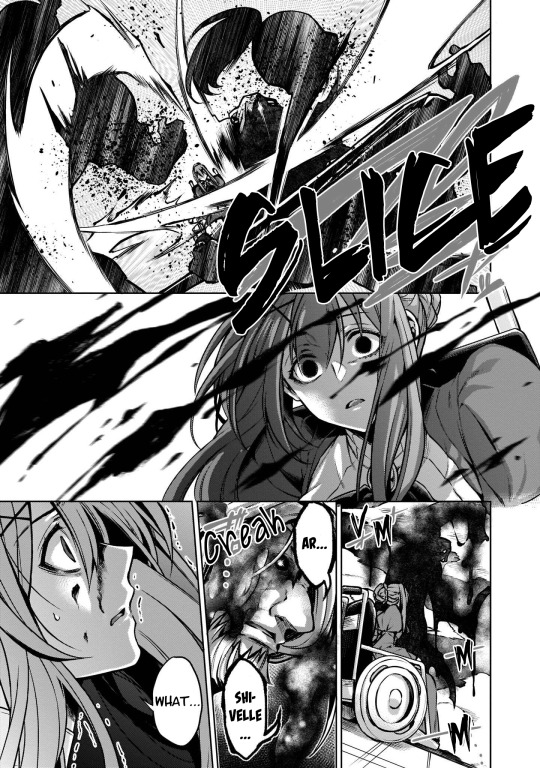
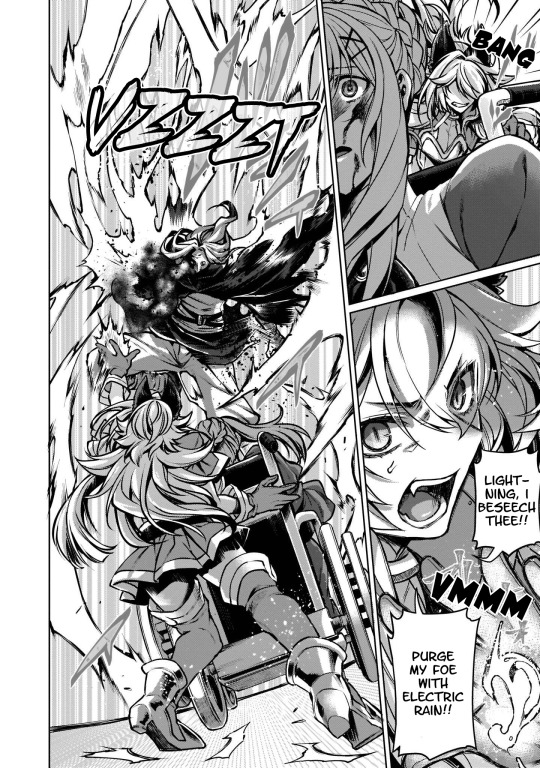
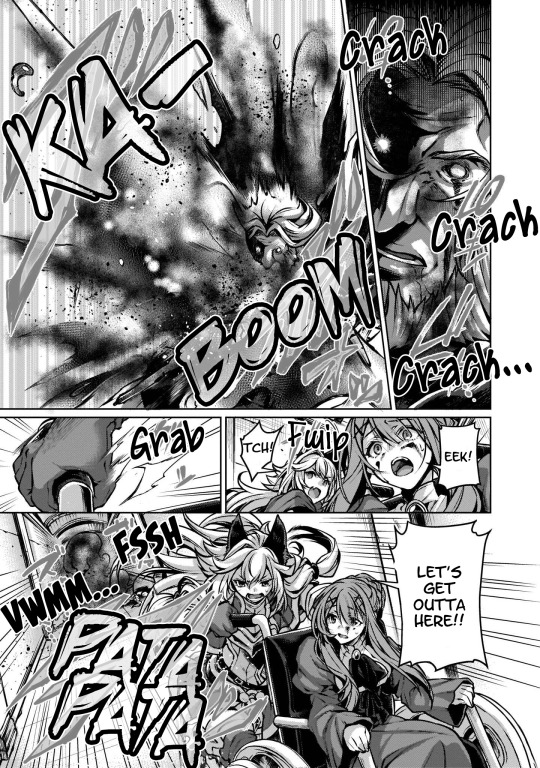
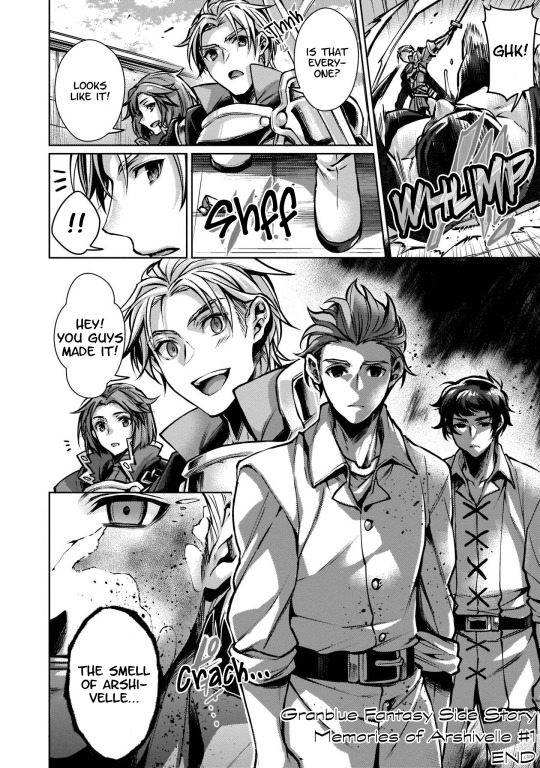


Previous chapter
Next chapter
Translator Notes:
Well! Things are certainly getting real at a rather rapid pace in the story.
As a general note, I do my best to keep as close to the original script as possible, but especially at dramatic moments like the ones in this chapter, I feel that the most important thing is to have an immediate dramatic impact on the English reader as the original would have had on the Japanese reader, so I’ve fudged some lines here and there to keep things intense in the case where it doesn’t meaningfully lose any narrative coherence or flow from the original to do so. For instance, the main meat of what Annette’s saying to herself immediately before Pommern’s mother finds her is consistent with the original, but the exact way she words things was changed somewhat to make it as dramatic in English as it was in Japanese, since a more closer wording would’ve sounded slightly stilted to a native English reader.
#granblue fantasy#granblue fantasy side story#side story#manga#memories of arshivelle#pommern#young pommern#annette#npcs#zanzekuel#hulk#shinza#pommern's mom#translator notes
29 notes
·
View notes
Text
Granblue Fantasy Side Story: Memories of Arshivelle (Chapter 6)
I’ve been slacking a bit, but I got back to it and finished up chapter 6 today. Enjoy!
Previous chapter
Next chapter




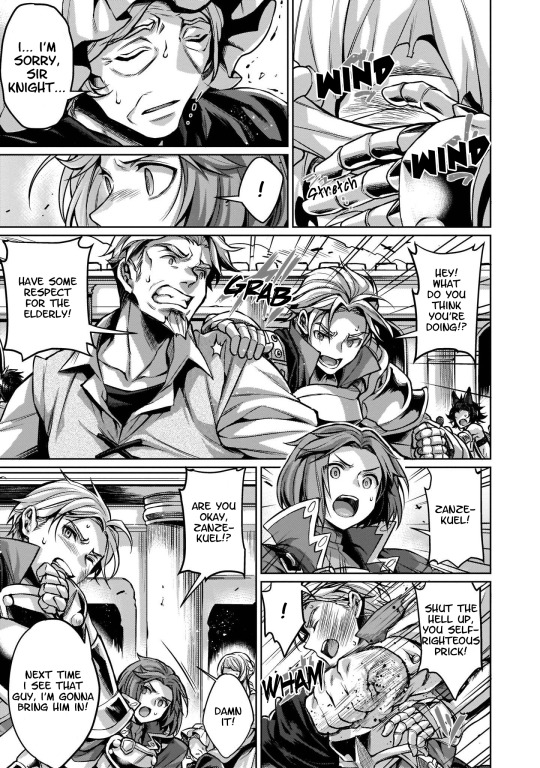


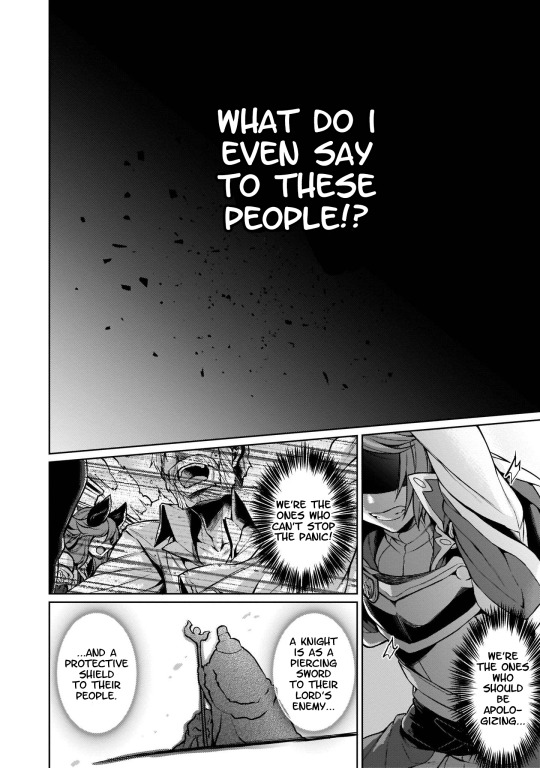

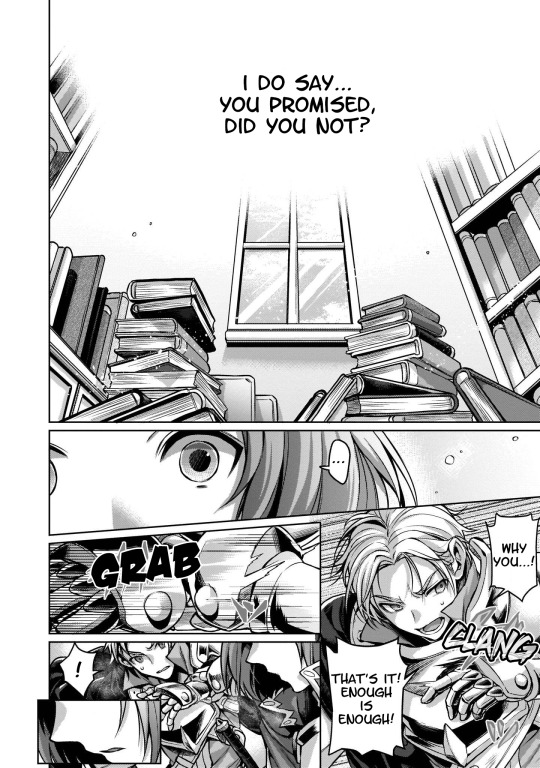

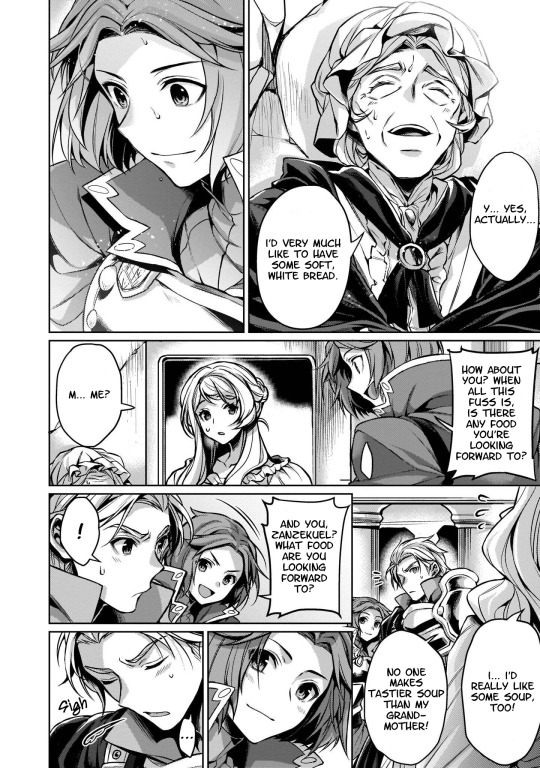

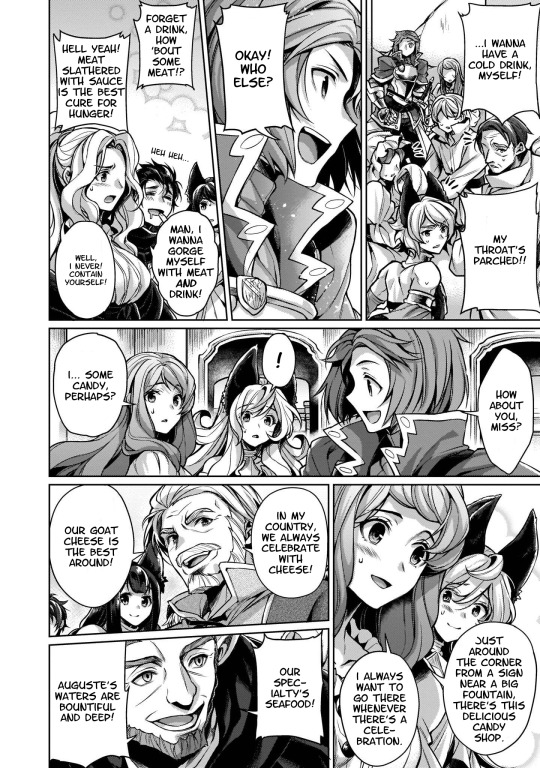
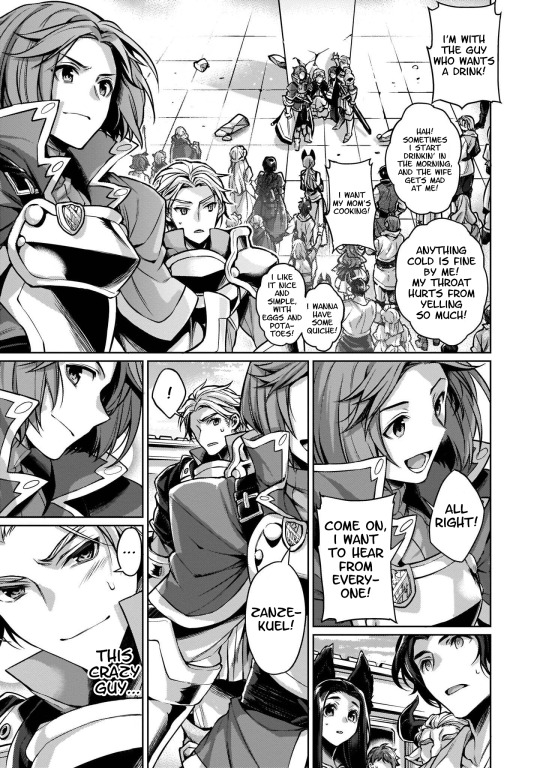

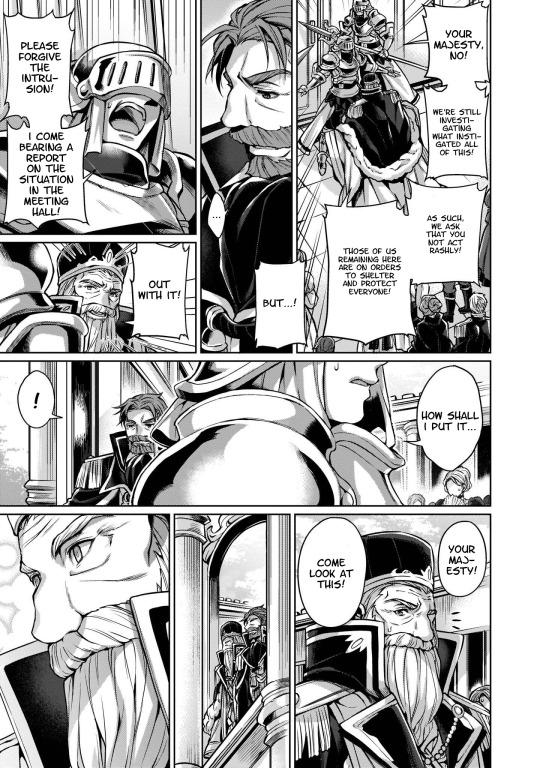




Previous chapter
Next chapter
Translator Notes:
There were some lines in this chapter that I had to translate loosely to make them not sound weird in English. The question that Pommern kept asking in Japanese was Nani ga tabetai desu ka?, or “What do you want to eat?” In English, however, phrased like that, it sounds like you’re a member of the serving staff at a restaurant asking for someone’s order. So, to retain the intended meaning, I changed that to “What food are you looking forward to?” in most cases. “How can I be the shield they need right now?” was a line I made up out of whole cloth; the original Japanese line was Watashi ga mezasu kishi wa--!!, for which a very literal translation would just be, “Regarding the knight that I strive to be--!!” I think the idea behind it was just that he was trying to figure out how to be the knight he wants to be, so I rewrote that line to call back to the previous panels to make it sound more like something an English speaker would say.
Also, one final note: yes, what I translated as “I do say” right before Pommern grabs Zanzekuel’s arm was indeed desu nee~ in the original Japanese. That’s all I’ll say about that for now. :)
#granblue fantasy#granblue fantasy side story#side story#manga#memories of arshivelle#pommern#young pommern#annette#npcs#lord segwell#king of zeilsten#zanzekuel#translator notes
29 notes
·
View notes
Text
Granblue Fantasy Side Story: Memories of Arshivelle (Chapter 5)
Got another chapter of Pommern’s past for you! Enjoy!
Previous chapter
Next chapter
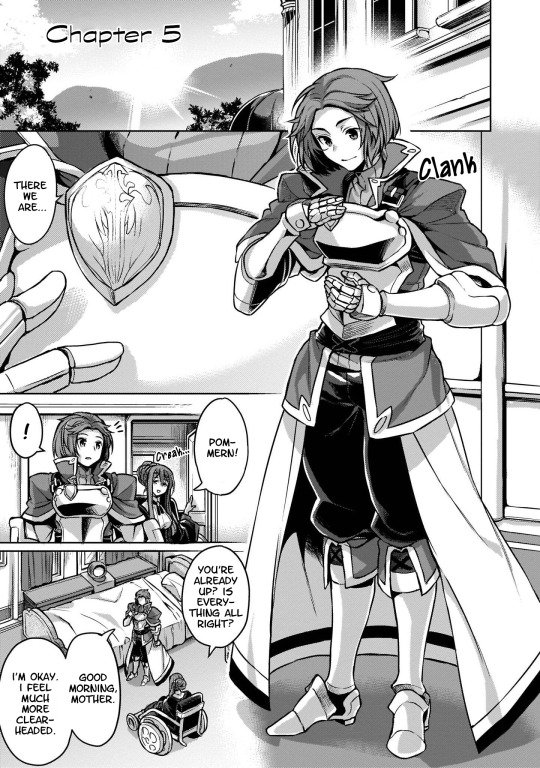

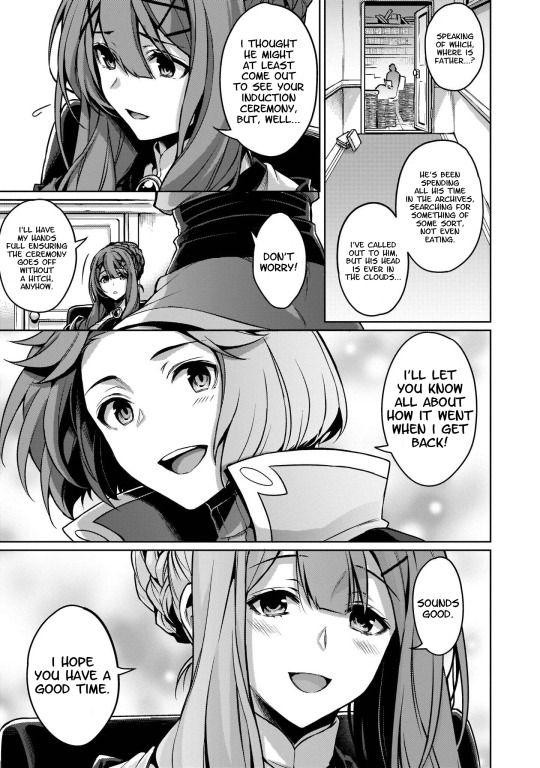
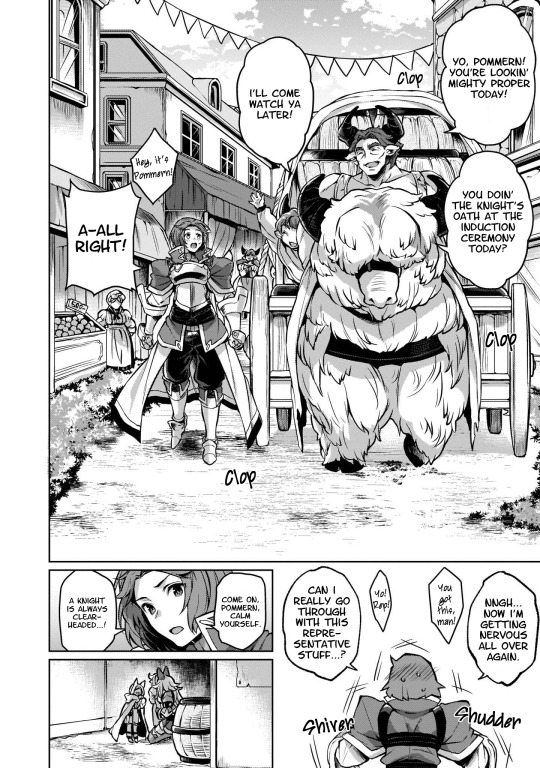
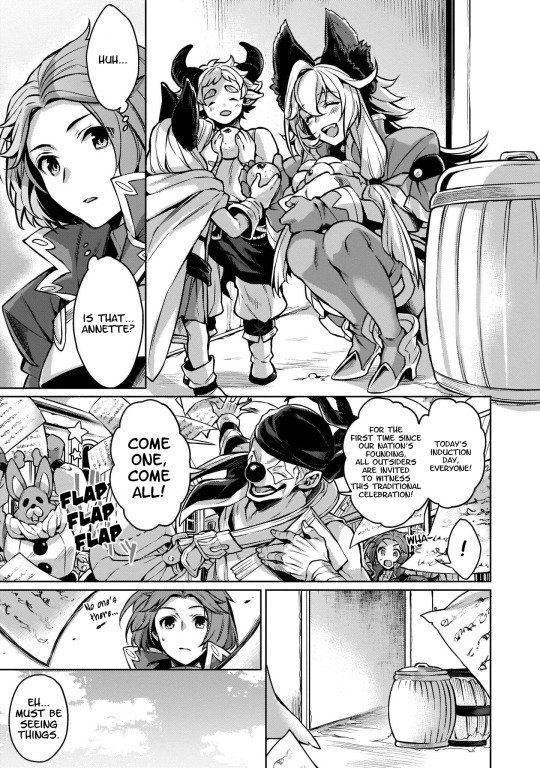
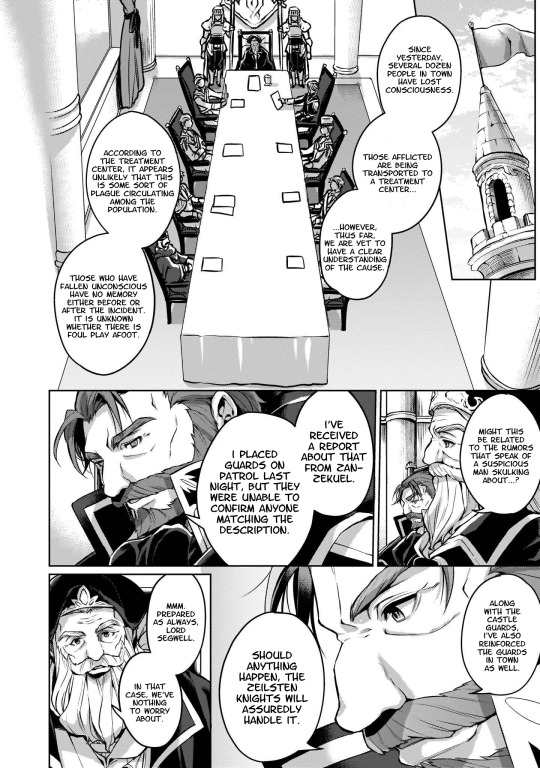
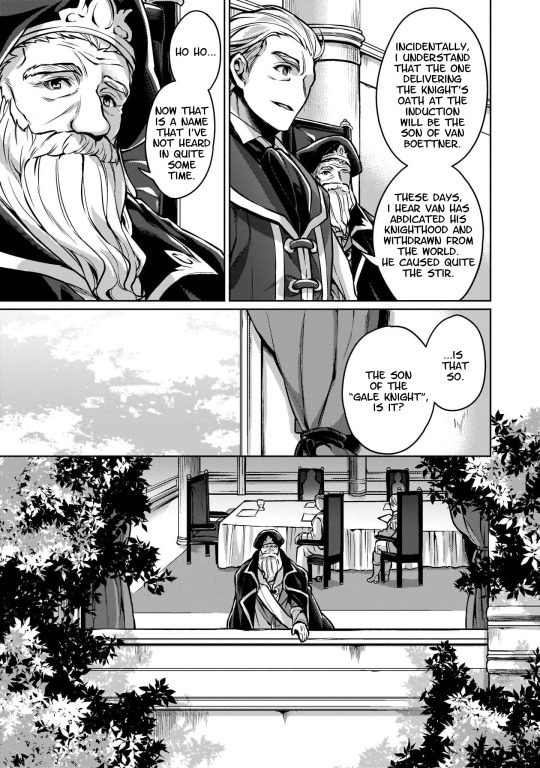

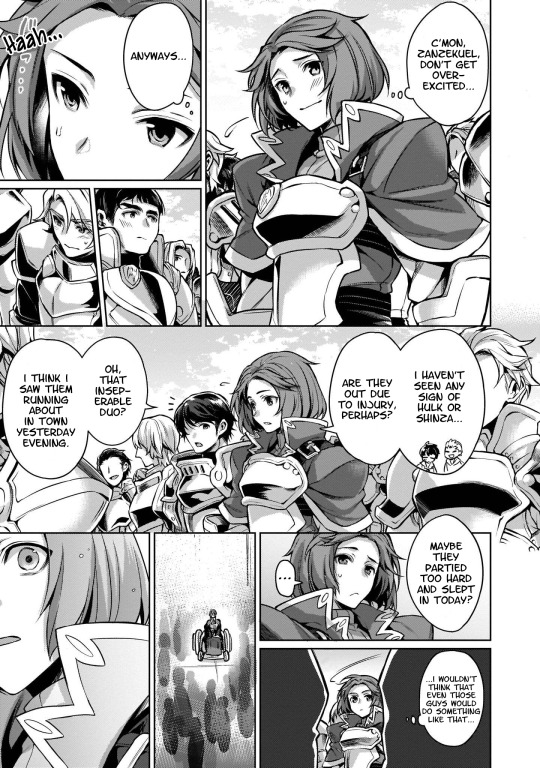
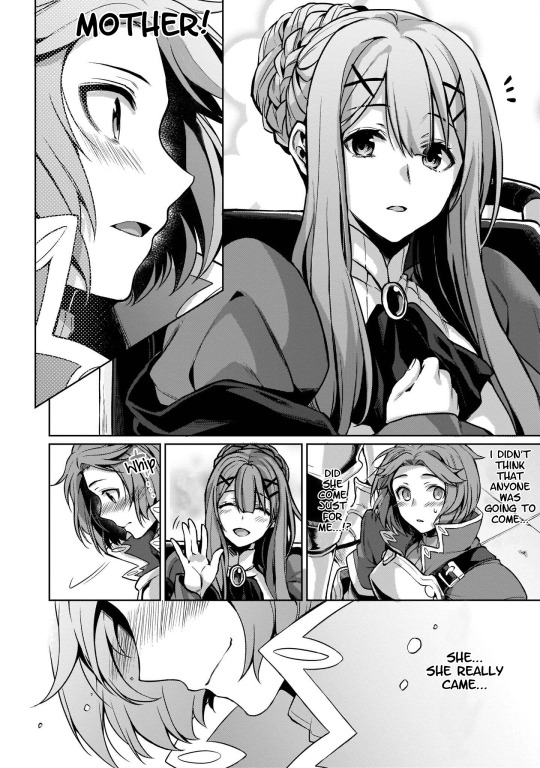
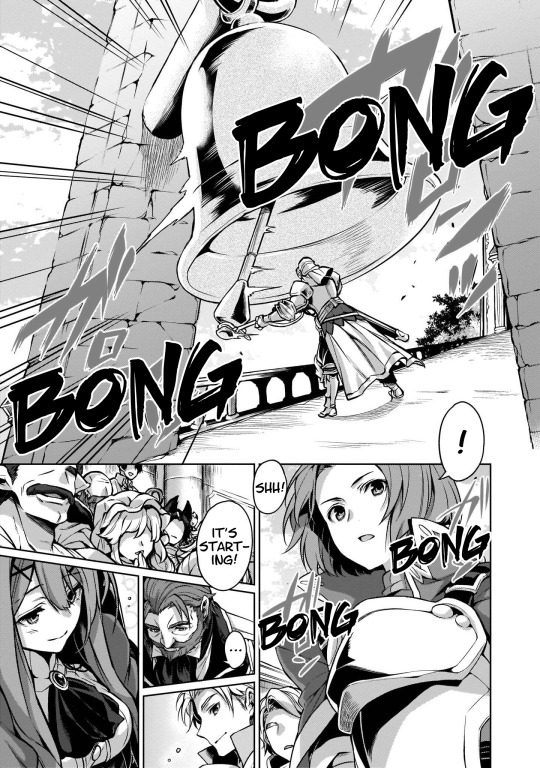
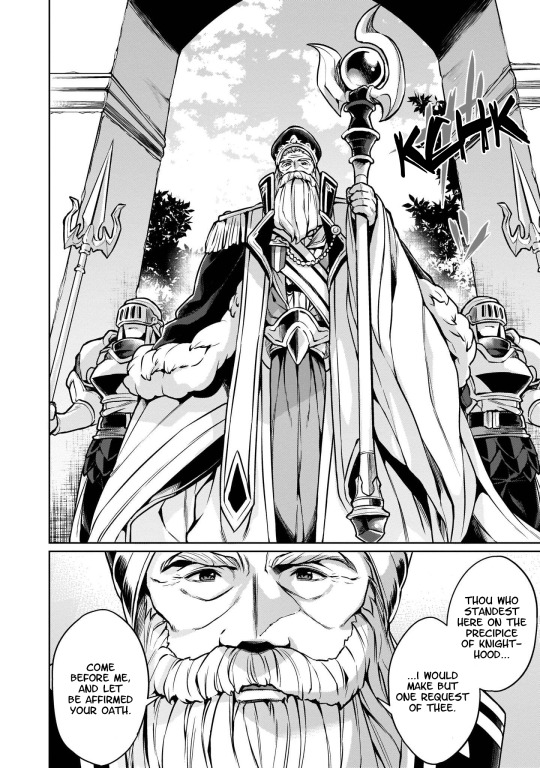
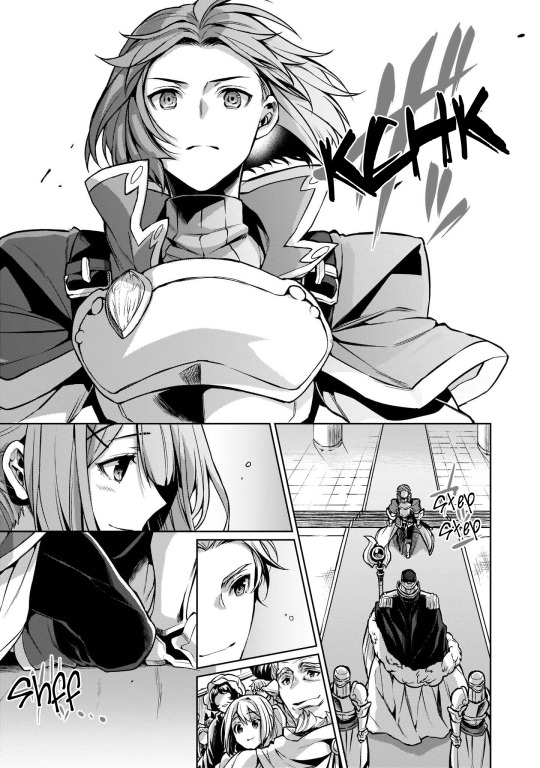
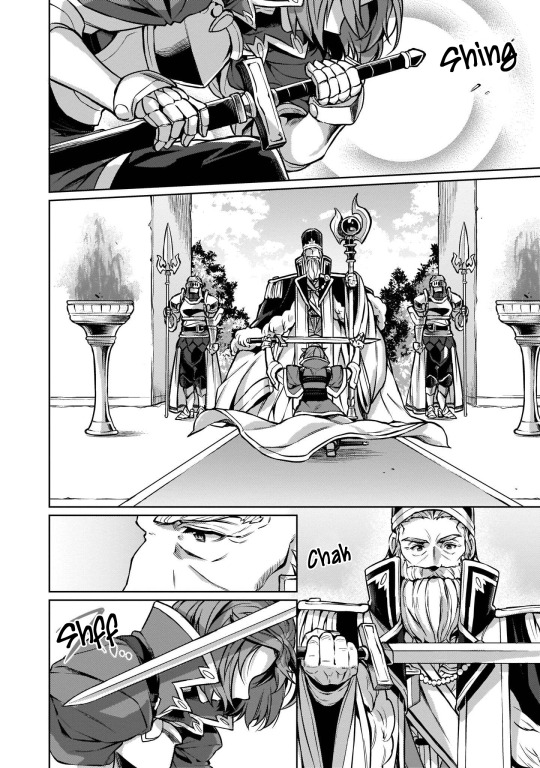

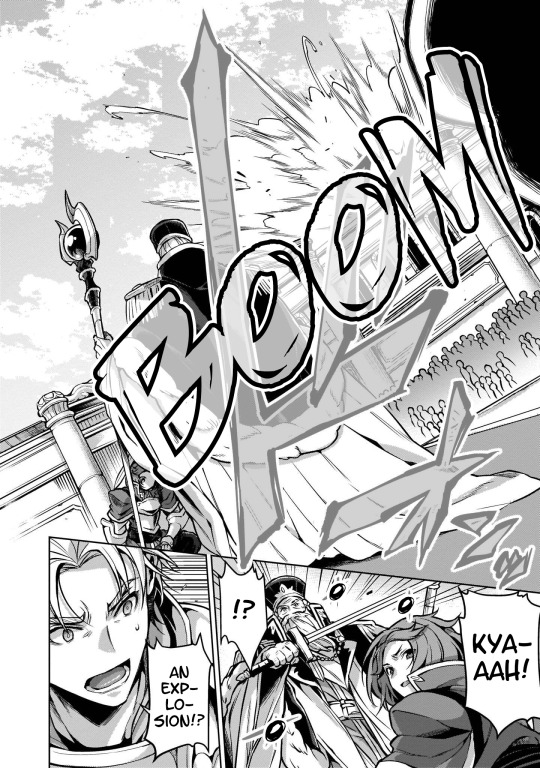




Previous chapter
Next chapter
Translator Notes:
The king’s speech during the oath ceremony uses some pretty archaic Japanese, containing pronouns like nanji, so to follow suit I styled his language in English as something approximating Shakespearean English. I personally find it annoying when people try to conjure up Shakespearean English by just randomly throwing in “ye”, “thou”, and “-eth” at arbitrary locations - it had its own grammar just like our language does! - so I did my best to do my due diligence and research to render it properly.
#granblue fantasy#granblue fantasy side story#side story#manga#memories of arshivelle#pommern#young pommern#pommern's mom#pommern's dad#annette#lord segwell#king of zeilsten#zanzekuel#hulk#shinza#translator notes
29 notes
·
View notes
Text
Granblue Fantasy Side Story: Memories of Arshivelle (Chapter 4)
Phew, this was a long one. Have a chapter!
Previous chapter
Next chapter






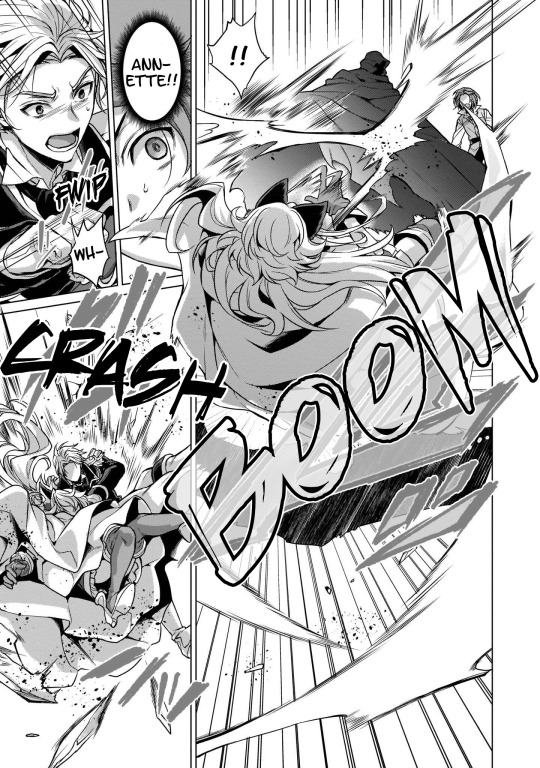



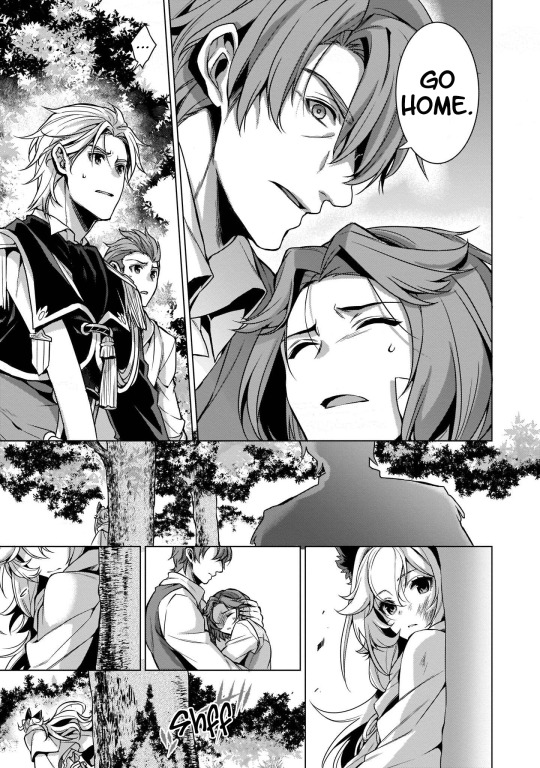




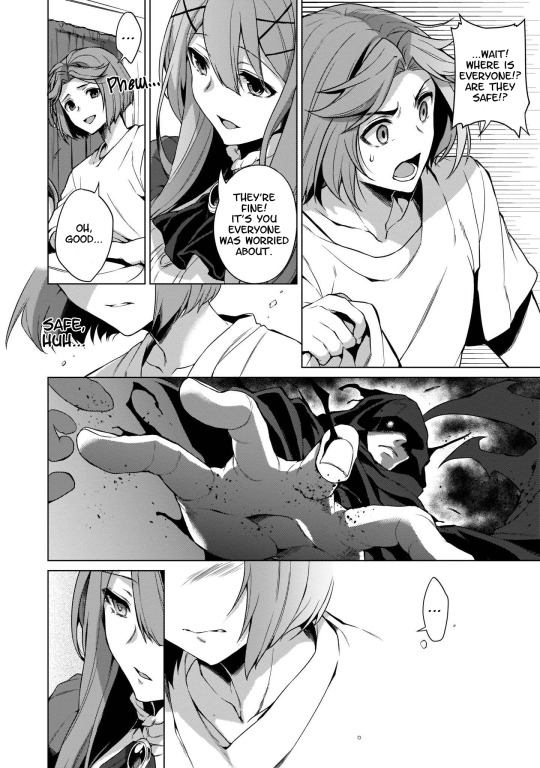




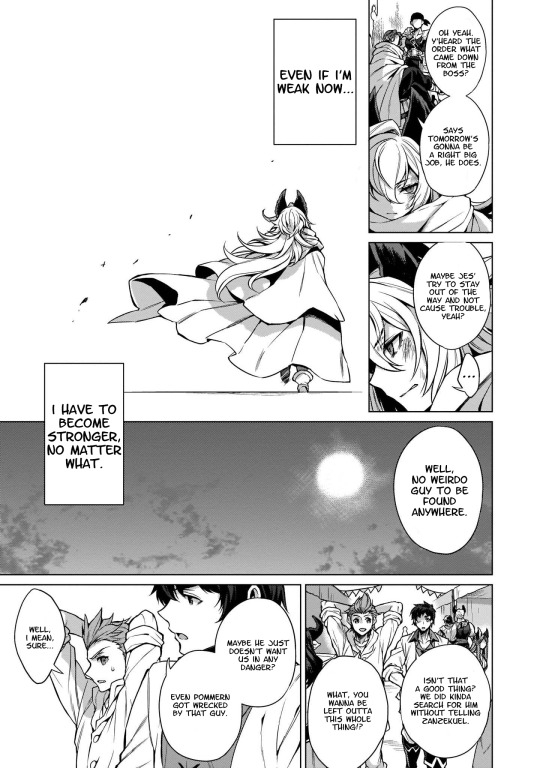

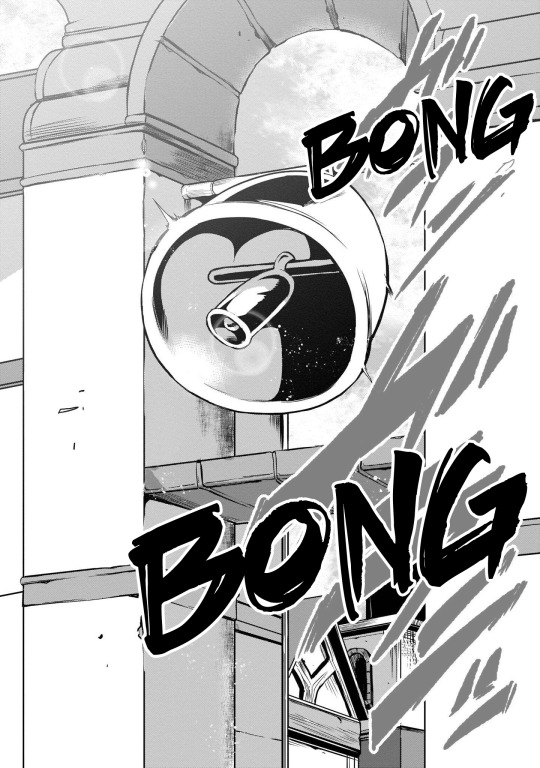



Previous chapter
Next chapter
Translator Notes:
Not too much to talk about for this chapter. I think I understood the exchange that the ruffians had with Annette near the end, though I’m not absolutely positive. He initially comments that Annette not having anything is mezurashii, or unusual, but then later seems to act towards her in a manner that would indicate that this isn’t as uncommon as previously suggested. My best guess regarding how to interpret this is that the initial word choice was intended as sarcasm, which is how I interpreted it in my translation.
#granblue fantasy#granblue fantasy side story#side story#manga#memories of arshivelle#pommern#young pommern#pommern's dad#pommern's mom#zanzekuel#hulk#shinza#zanzekuel's butler#annette#translator notes
38 notes
·
View notes
Text
Granblue Fantasy Side Story: Memories of Arshivelle (Chapter 3)
Hey, everyone! Have another chapter. :)
Previous chapter
Next chapter

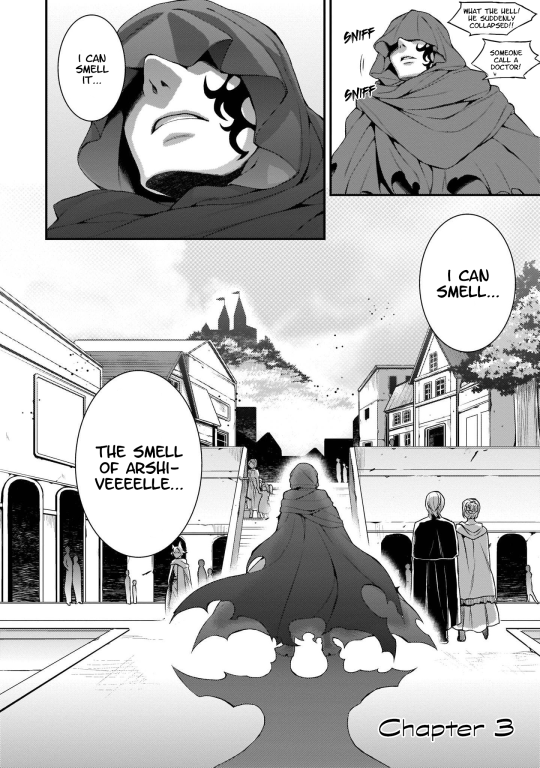
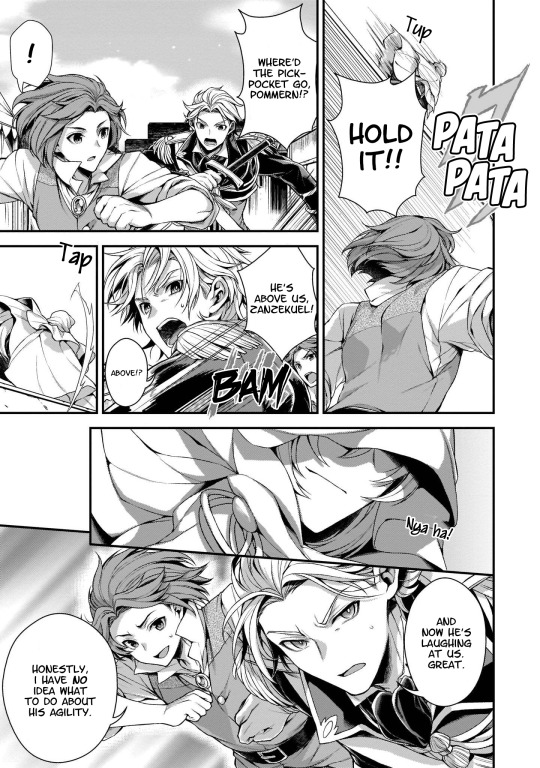

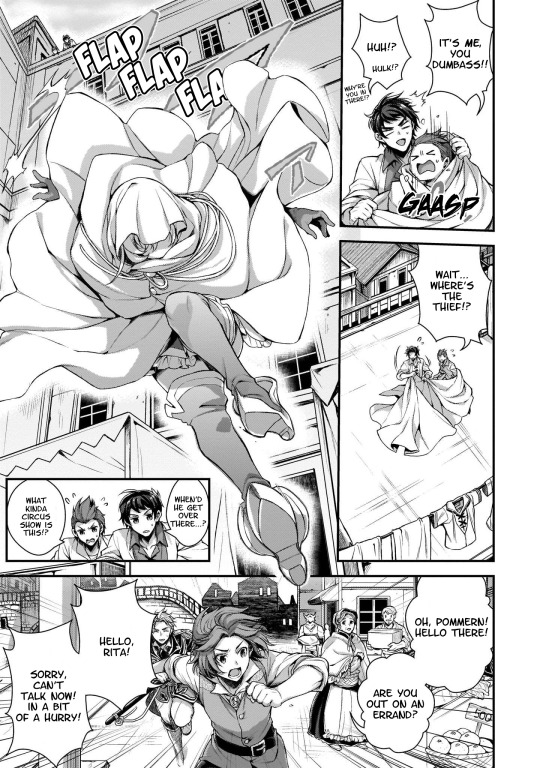







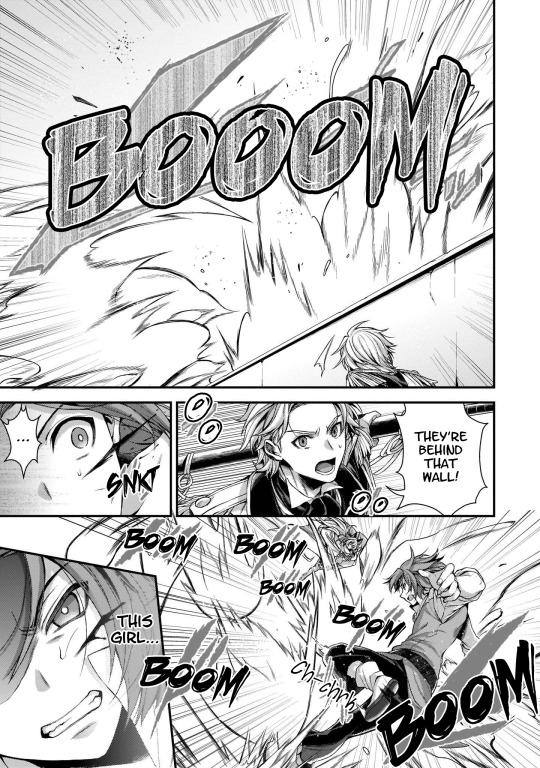





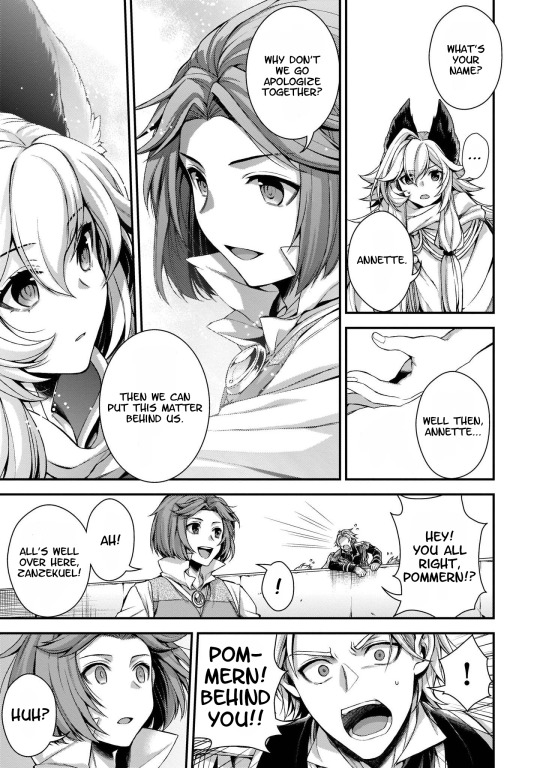



Previous chapter
Next chapter
Translator Notes:
There are a few localizations that I had to do here that I should talk about briefly, just for transparency.
The first relates to Annette’s accent. Her Japanese word choices (when not casting a spell) are decidedly masculine, expressing that her personality is pretty strongly tomboyish, and that she should be written with a brash demeanor. She also has a tinge of Kansai dialectic choices in her words, though it’s not nearly as pronounced as someone like Yuel, which implies that she’s intended to come across as somewhat low-class, but probably not so far as to appear as a country hick sort of person. I thought about what sort of accent would convey this sort of demeanor and personality in a natural fashion to a Western audience, and ultimately concluded that an Irish accent would probably get the job done. Obviously, this is a complete creation from whole cloth on my part, but given that I can’t exactly literally convey “a slight Kansai accent with a masculine tinge” in English, I figured this would be the next best thing to keep the effect on a native English reader the same as the original script would’ve been on a native Japanese reader.
On the other hand, when Annette is casting a spell, she uses somewhat archaic word choices like waga and attaching the particle yo directly to a subject, which are completely unlike her normal speaking tone of voice. I followed suit by having her speak in Shakespearean English for those sections, and I translated the yo attachment to a subject as “I beseech you” - not at all a direct translation, but my approximation as the intention of emphasizing her address towards the element she’s using.
The second relates to the way Pommern first talks to Annette that upsets her, and then how he corrects himself after that. In Japanese, there are three different auxiliary verbs you can use after the -te form of a verb to talk about doing that action for someone. The standard verb is ageru, which is typically used in a neutral setting where the social hierarchy difference between the speaker and the listener is either equal or unknown - for example, to speak of telling someone something, one might say oshiete ageru. However, there also exist two others, the first of which is kudasaru, which is used in cases where the speaker’s status is lower than that of the listener’s status; and the second of which is yaru, which is used in cases where the speaker’s status is higher than that of the listener’s status.
In the original Japanese, Pommern first says to Annette, Owari ni shite yarou, which literally means, “Let me bring this to an end for you,” but contains two things that offend Annette - firstly, the fact that he uses a form of -te yaru, implying that he thinks she’s at a lower social status than he is, and the second is using the auxiliary verb in the first place, which implies that he believes that resolving things would be doing her a favor. Then, after the conflict, he amends his statement to, Owari ni shiyou, which literally means, “Let’s bring this to an end,” with both of those previously mentioned aspects now absent from his words.
In English, there’s no direct way to translate this, so as a stand-in, I had Pommern use somewhat belittling language the first time in a way that would indicate that he’s not treating her as a serious equal, and then had him use much more polite and respectful language the second time. Hopefully, that has the same sort of effect for an English audience as the original would’ve had on a Japanese audience.
#granblue fantasy#granblue fantasy side story#side story#manga#memories of arshivelle#pommern#young pommern#zanzekuel#hulk#shinza#annette#translator notes
32 notes
·
View notes
Text
Granblue Fantasy Side Story: Memories of Arshivelle (Chapter 2)
May I offer you a translation in these trying times? :)
Previous chapter
Next chapter












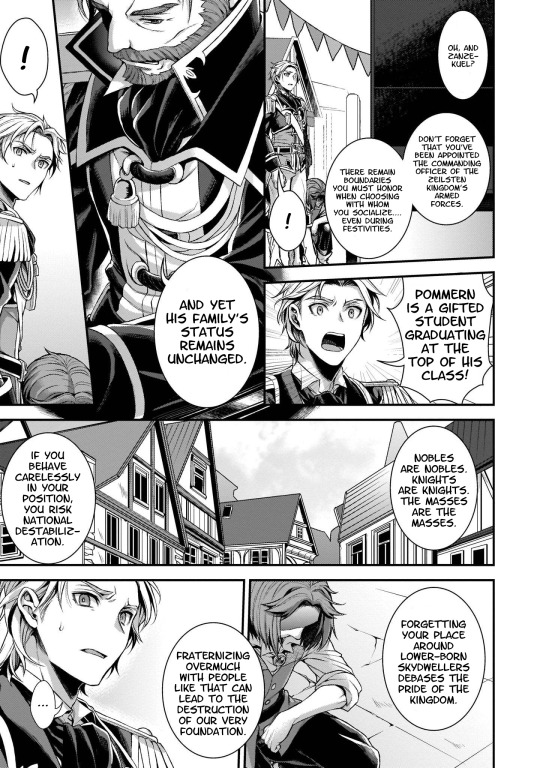
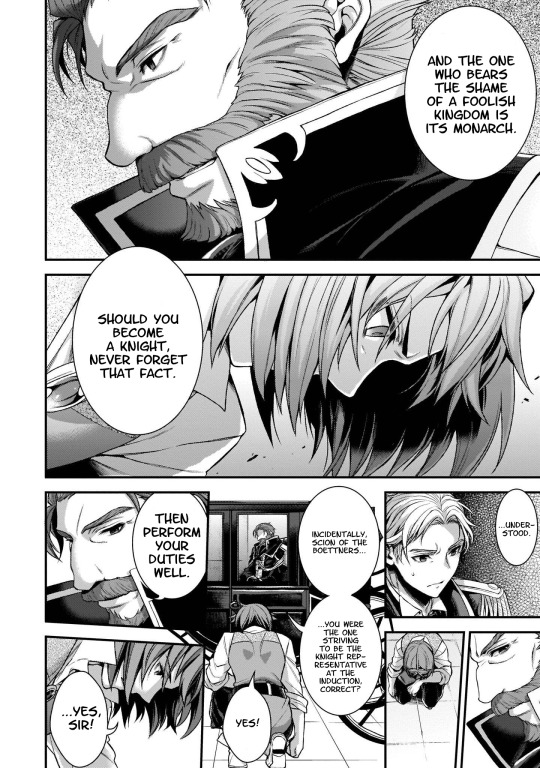
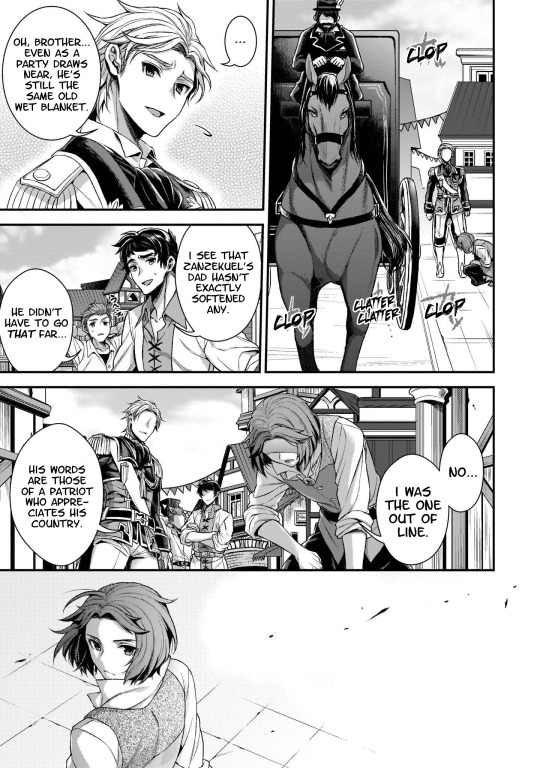
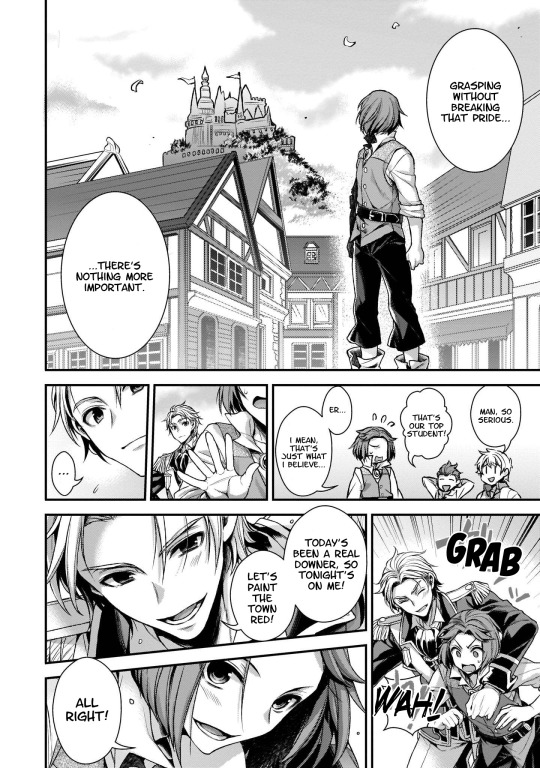

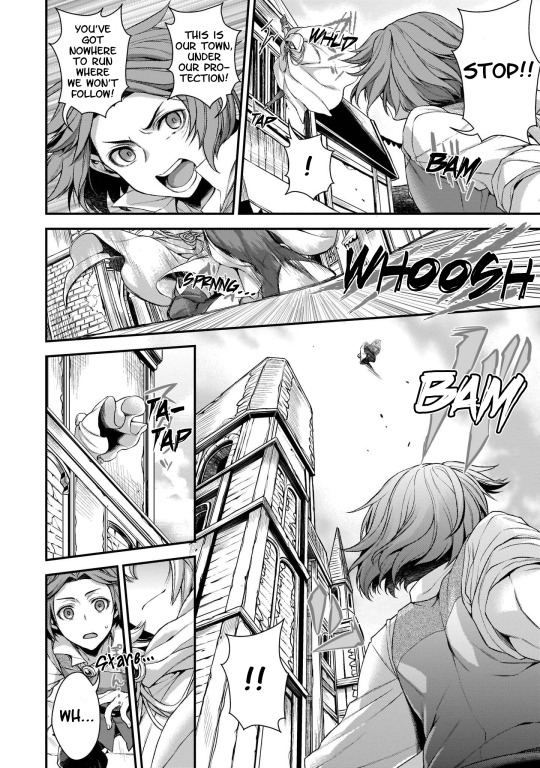
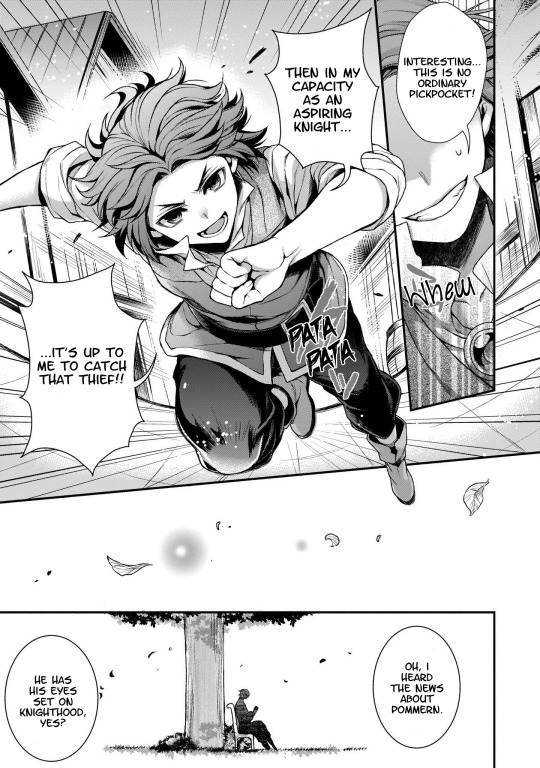



Previous chapter
Next chapter
Translator Notes:
I had to do a bunch more translation of names that have no clear English counterparts, so I did my best. The original Japanese names are, in order of appearance (with my translation in parentheses), Zeirusuten (Zeilsten), Haruku (Hulk), Shinza (Shinza), Zantsukuru (Zanzekuel), Rihyaruto (Richard, German pronunciation), and Seguweru (Segwell). Based on the fact that Rihyaruto is specifically the way that Japanese renders the German pronunciation of “Richard”, I hazarded a guess that names from Zeilsten are meant to be Germanic in nature, so I did my best to give them a Germanic air while still staying as true as possible to the original Japanese pronunciations.
The lines spoken both by the Zeilsten official at the beginning of the chapter and by Lord Segwell in the middle are dense. I believe I've gotten at least close enough to the intended meaning to not have jumbled anything (and I've read far ahead of what I've translated just to make sure I'm not writing myself into a corner), but hoh boy, those bits really made me wonder what I had gotten myself into. This is straining my understanding of Japanese more than anything else I've translated to date.
I also think that I understood the last line of Pommern’s father in the third-to-last page, but I’m not positive. He spoke of a deau koto nai jinsei, which literally translates as “human life that cannot be encountered by chance” - my best guess as to the intended meaning is that he’s saying that he’s a recluse that no one’s going to happen to meet, but it’s a weird way to phrase it, so I’m not 100% positive.
#granblue fantasy#granblue fantasy side story#side story#manga#memories of arshivelle#pommern#young pommern#pommern's mom#pommern's dad#hulk#shinza#zanzekuel#lord segwell#translator notes
41 notes
·
View notes
Text
Granblue Fantasy Side Story: Memories of Arshivelle (Chapter 1)
Next chapter
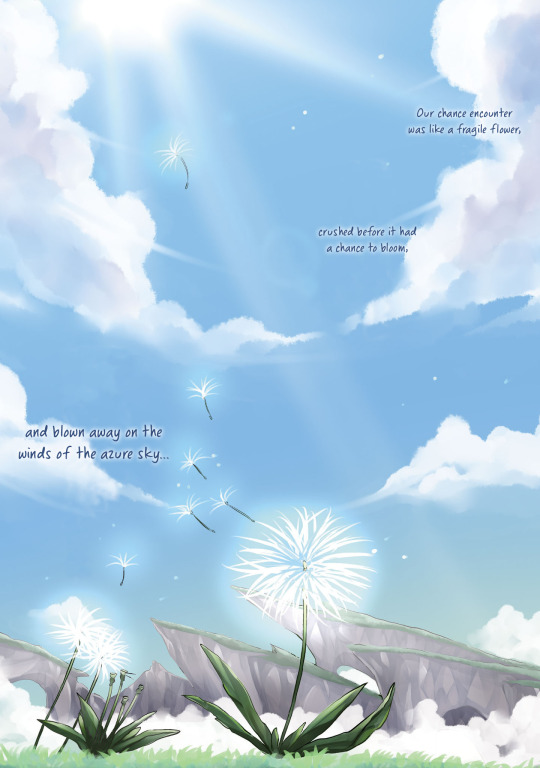




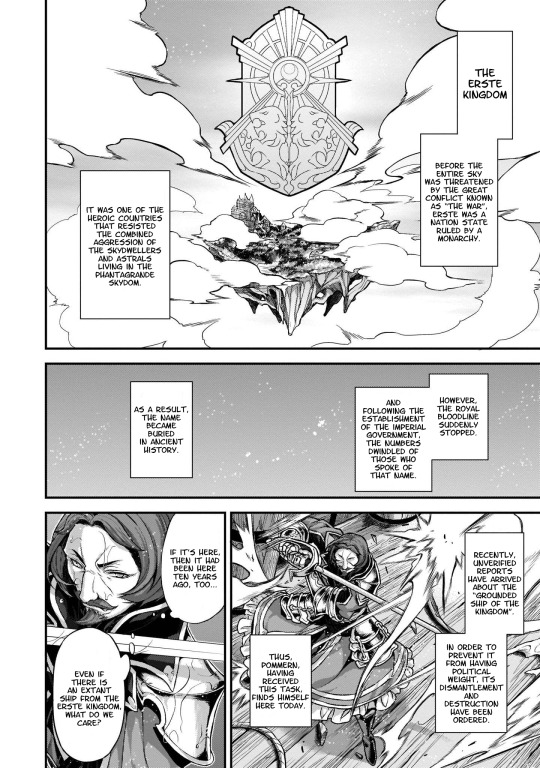
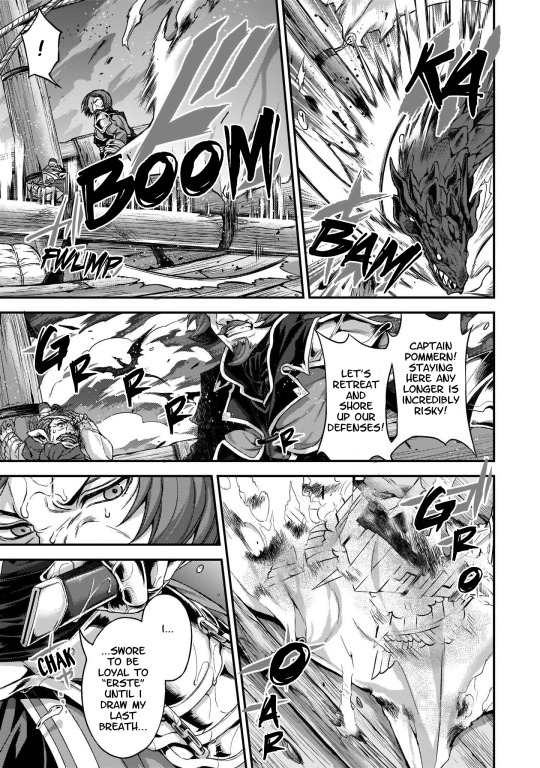
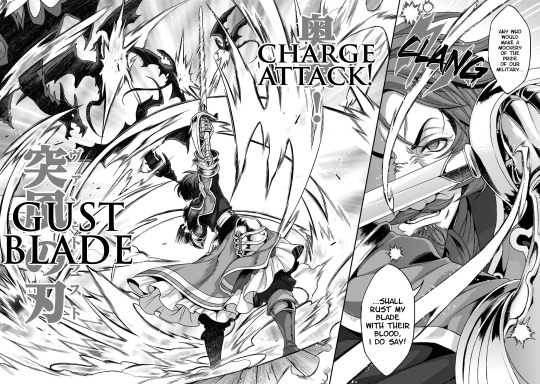


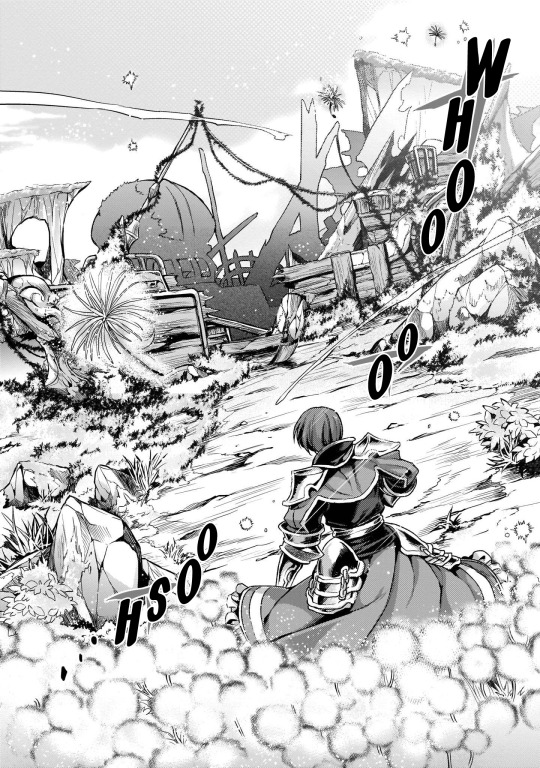

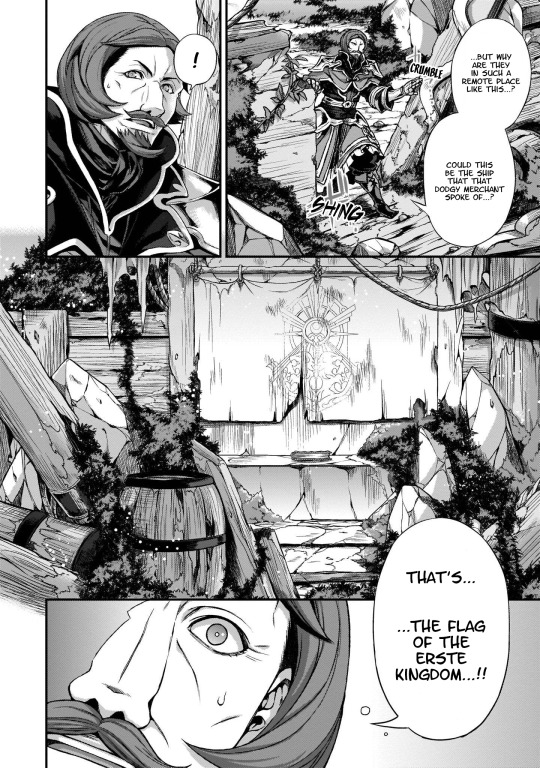
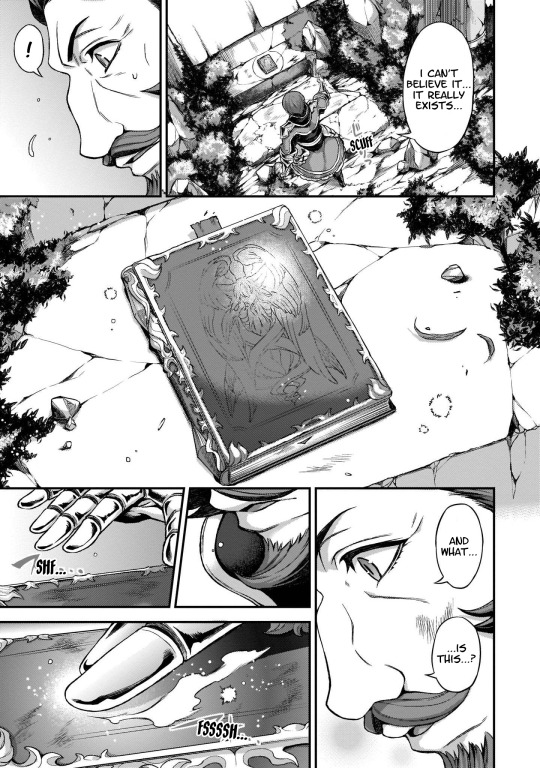
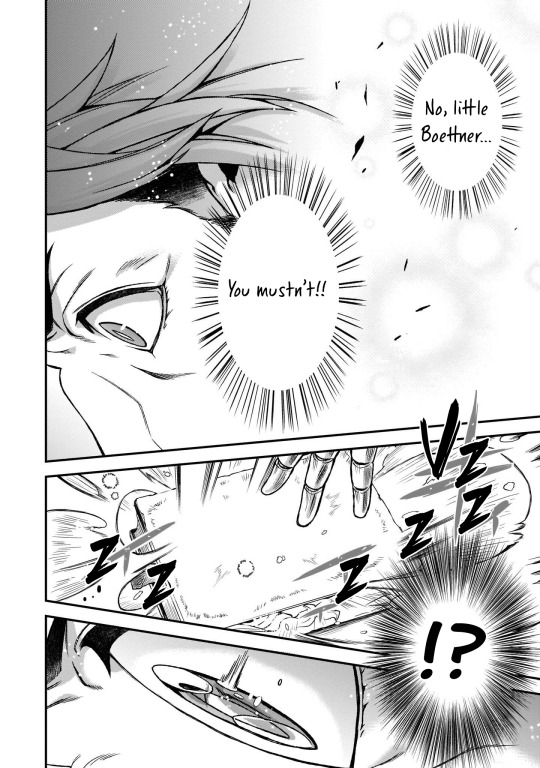

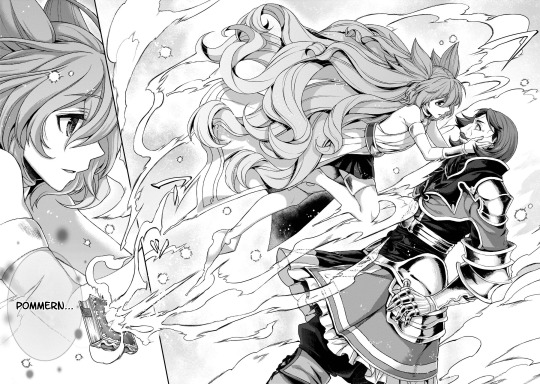

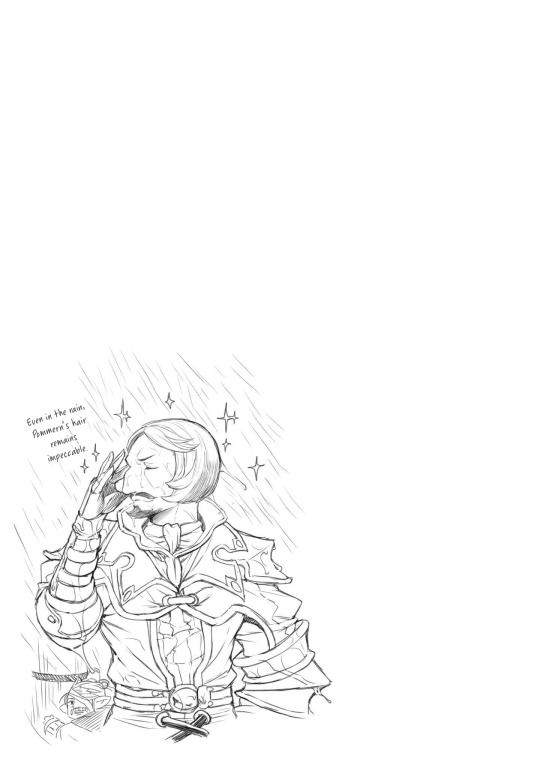

Next chapter
Translator Notes:
I can’t find any official confirmation on whether there’s an official English translation of the name in the title of this series - the Japanese is Aashiveru, which seems to be a name made up just for this story; I can’t find any other record of that name, and searches for it only turn up this series. I chose “Arshivelle” based on the fact that that’s how the wiki translates the GBF item you get from purchasing the manga, but I don’t know if that’s how the item’s name is actually rendered in-game if you redeem a code and then switch to English. If anyone happens to have this item and could confirm, that’d be awesome.
The text on the first page was very heavily edited by me, mostly because it was supposed to be poetic, and a literal translation... really would not have properly conveyed that. I kept the main ideas intact - that there was a meeting, that it was brief, and then it was over, but I took creative license on the specifics beyond that.”
“Shall rust my blade with their blood” was similarly edited for Western clarity. The Japanese was literally just “shall rust my blade”, but that’s a Japanese samurai trope in which it’s culturally understood that the catalyst of said rust will be the blood of one’s enemy. Given that this trope doesn’t exist in the West, I figured making it a bit more explicit wouldn’t hurt.
#granblue fantasy#granblue fantasy side story#side story#manga#memories of arshivelle#pommern#imperial soldier#npc#monster#translator notes
49 notes
·
View notes
Photo

Episode 1473: Lucius Hunts the Remnants
#granblue fantasy#grand blues#translation#translated#english#goblin mage#goblin princess#high goblin mage#lucius#teena#vyrn#space-out magic
30 notes
·
View notes
Photo

Episode 1472: The Human Knowledge Quiz
Translator Notes:
Ningen is always a bit of a tricky word to know exactly what to do with in Granblue Fantasy. It technically means “human”, but is often used in Granblue Fantasy to refer to every normal type of humanoid entity - human, erune, draph, and harvin. When spoken by primal beasts or dragons, “mortal” is often used by the official translation, but the case of this comic, the presence of Cassius and Joy, neither of whom are immortal, complicates matters. I ultimately decided that just saying “screw it” and rendering it as “human” is close enough and reflects the main idea behind the usage of the word to readers without needing to worry about its exact implications.
Episode 607, referenced in this comic, can be found here.
#granblue fantasy#grand blues#translation#translated#english#zooey#olivia#primal beast#joy#cassius#scathacha#lyria#ippatsu#translator notes
44 notes
·
View notes
Photo

Episode 1471: Another Grand Battle
#granblue fantasy#grand blues#translation#translated#english#grand order#primal beast#vyrn#shapeshifter vyrn#carren
58 notes
·
View notes
Photo

Episode 1470: Danua and Baths Again
Translator Notes:
Ugh, I did my best to salvage this joke in English, but Unheil posed such a pivotal role in the original Japanese comic, both in the script and in the visuals, that my options were extremely limited.
The original Japanese joke centered around the Japanese name for Unheil, Unhairu - the phrase Un, hairu roughly means, “Yeah, I’ll get in”, so the joke is that she waves around the harp in front of Danua, asks her whether she’ll get in the bath, and then asks her what the name of the harp is, resulting in Danua saying Unhairu, which the Morrigna sisters interpreted as Un, hairu - i.e., that Danua is agreeing to get into the bath.
...The original Japanese was a pretty lame joke anyway, I suppose.
#granblue fantasy#grand blues#translation#translated#english#danua#hansel#badb#macha#neamhan#morrigna#primal beasts#unheil#weapon#translator notes
42 notes
·
View notes
Photo

Episode 1469: Danua and Baths
Translator Notes:
We’ve had a fairly long run without much in the way of Japanese-specific wordplay, but it looks like my luck has run out, as this comic is entirely based around that. The Japanese word for “bath” is furo, and Godsworn Alexiel’s Japanese name is Goddogaado Buroudia, so the Japanese script gave her the joke name in the third panel of Goddogaado Furoudia, or “Godsworn Bath-exiel”. The Japanese word for “cold bath” is mizuburo, so she similarly is titled Goddogaado Mizuburoudia in the fourth panel. I did my best to give her similar alterations to her English name that still fit the pattern.
#granblue fantasy#grand blues#translation#translated#english#danua#gretel#europa#primal beast#hansel#alexiel#translator notes
88 notes
·
View notes
Photo

Episode 1468: Joy Fulfills Its Role
Translation Notes:
“Ravening” is a neat word that the English localizers pulled out for this event, which I had previously never heard of. It’s something they invented; his Japanese name was just Gouyoku Raizou, or “Greedy Raizo”.
One thing that’s nice about Japanese, and which causes problems when translating into English, is that Japanese is a very pictographic language, meaning that when you’re displaying labels, a warning message, or something like that, you can often cut corners and just display the general concept you want to display without needing to spell out a full phrase or sentence. In the case of this comic, what I translated into “100%” in the fourth panel was 限界 (genkai - “limit” or “bounds”), while what I translated into “Explosion Imminent” in the last panel was literally just 爆 (the kanji for “bursting/splitting open”, and the first kanji in bakuhatsu, or “explosion”).
#granblue fantasy#grand blues#translation#translated#english#joy#yuisis#ravening raizo#rackam#jin#rackaaam#elegy for auld lang syne#translation notes
41 notes
·
View notes
Photo

Episode 1467: Vikala’s Debut
Translator Notes:
Oh boy, this is a great episode! There’s a lot of clever and neat stuff in here that deserves to be unpacked, a lot of which were somewhat lost in translation.
First, one interesting thing is that, in the Japanese script, Vikala’s personality change between yin and yang is even more explicit - she actually changes which pronoun she uses. When she’s in bubbly yang mode, she uses boku, which is most commonly a male pronoun, but which is also often used in Japanese media by somewhat tomboyish, energetic girls. When she slips into sullen yin mode, however, she uses atashi, which is a much more girly pronoun. This isn’t really something you can translate into English, aside from having her be generally more tomboyish when in yang mode, but it’s a neat thing to note.
Second, there’s a triple pun in the final panel that is just marvelous, but which I unfortunately can’t translate in the slightest into English. Vikala’s yang-mode name is Vicky, or Bikki in Japanese (the Japanese language has no V sound, so a B sound is used in its place). The sound effect used here to indicate Vyrn’s brain stimulation is bikibiki, so in a very literal way Vyrn is “Vickying” Vikala to turn her back to yang mode. In addition to that, Vyrn’s Japanese name is Bii, so in her final line, Vikala comments that she is being Biikibiki’d, thereby adding Vyrn’s name to the pun mixture as well. It’s really silly and clever, and I’m sad that I more or less had to just remove it all while translating to English.
Third, for reasons completely and totally lost to me, the Joya is speaking Japanese using Latin letters in the second panel. I don’t have any idea what this is meant to represent, but my best guess it that it’s meant to establish that the Joya is acting very off, so I did my best to give an English approximation of what I think the intended effect is.
#granblue fantasy#grand blues#translation#translated#english#vikala#divine general#joya#vyrn#shapeshifter vyrn#joy#new year#translator notes
131 notes
·
View notes
Photo

Episode 1466: The New Year Sets Sail!
#granblue fantasy#grand blues#translation#translated#english#noa#lily#tweyen#eternal#shiva#primal beast#belial#rackam#rackaaam#new year
143 notes
·
View notes
Photo

Episode 1465: Yuisis and Lucius
Translator Notes:
I’m not quite sure where the Wiki got the title of “Tragic Swordsman” for Lucius. His Japanese title is hifunkougai no kengaku, in which kengaku does mean “swordsman”, but hifunkougai is a big word that’s hard to directly translate. It’s written as four characters, 悲憤慷慨, which mean (respectively) “sad”, “anger”, “grieve”, “lament”. Broadly speaking, it refers to the state one finds oneself in when one is full of both sorrow and anger over worldly injustice. “Outraged by injustice” really doesn’t entirely do the word justice, but it certainly seems better than “tragic”.
#granblue fantasy#grand blues#translation#translated#english#yuisis#lucius#zeta#kumbhira#divine general#the society#new year#translator notes
28 notes
·
View notes